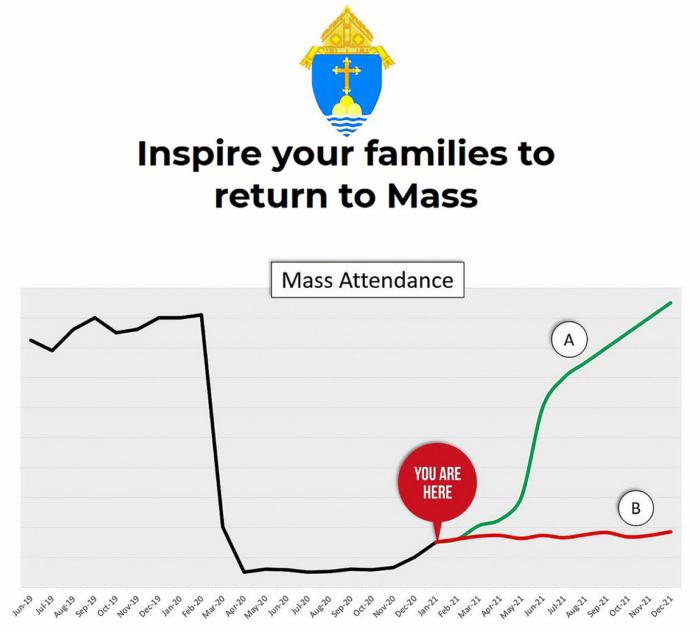Local
Webinar looks at ways to welcome parishioners back to Mass
By Jacqueline Tetrault Pilot Staff
Posted: 4/16/2021


A graphic from the webinar illustrates potential future Mass attendance. Pilot screen capture
BRAINTREE -- When will the coronavirus pandemic "end," and what will happen when it does? Those questions have been on people's minds for over a year and were addressed during a webinar about forming "A Welcome Back Plan for Your Parish" on April 12. The webinar was meant to give pastors and parish staff creative ideas for engaging with parishioners as the coronavirus pandemic becomes less severe.
Father Paul Soper, archdiocesan secretary for Evangelization and Discipleship, offered an opening prayer and spoke briefly about other recent webinars and his own discussions with pastors and parish councils. He said he has heard multiple people say they were not aware that the mission of their parish is to make disciples.
"The parish is not the goal of your parish. Making disciples to Jesus is the goal of your parish," Father Soper said.
The webinar's main presentation was given by Nic Prenger of Prenger Solutions Group, a Catholic digital consulting firm. Last year, he ran a webinar series on "How to Run a Parish During the Coronavirus."
Prenger named three lessons that parishes have learned over the course of the pandemic: parishes that take action do well; communication, and even over-communication, works; and parishes like having a plan to follow.
He said it is alright to adjust plans. It is better to change course than to not have a plan at all.
"You should err on the side of action. Do not err on the side of inaction," he warned.
During his presentation, Prenger shared an example of a month-by-month plan and outlined three phases for drawing people back to Mass and other parish activities.
The first phase is to "cast the vision," giving parishioners a "sneak peek" of what the parish hopes to do in the future. The second phase is to "plan and prepare," setting up committees for different aspects of welcoming people back, such as organizing social activities for different age groups. The third phase is to "celebrate and commemorate," holding special community-building events while gradually returning to normal ministries and activities.
Most people imagine a time will come when the pandemic is proclaimed to be over, but in reality, it will not happen that way, Prenger said.
"What we will have is a gradual loosening of restrictions and a gradual improvement in vaccine rates or people's willingness to go out," he said.
He argued that parishioners "need that plant-a-flag moment, that line in the sand. You need to create that for them. And I don't mean that from a theological standpoint; I mean that from a very practical, psychological, human behavior standpoint. They need that big moment when you can say, this is it, we're celebrating, we've done it, we're turning the corner."
He shared ideas for projects that parishes can invite their members to participate in to celebrate returning to parish life and commemorate their pandemic experiences. His suggestions included making time capsules, creating a remembrance wall, decorating tiles for a mosaic, and planting a parish garden.
Prenger also spoke at length about the importance of communication and how it can be carried out.
He recommended surveying parishioners about how the pandemic has impacted them -- whether they lost a loved one, missed a sacrament, or have concerns about coming back to Mass. He also emphasized the impact that letters from a pastor can have on parishioners. Even if they are not about fundraising, they seem to prompt greater financial support from parishioners.
"Heartfelt letters work. They always have, they always will," Prenger said.
He encouraged parishes to make daily social media posts, arguing that this is a free resource to connect with parishioners who are already active online.
"The world has gone digital. And it went digital long before the pandemic. The pandemic didn't make everybody move from paper to online communication, but it did accelerate it," he said.
He shared statistics about parish Facebook pages before and after March 2020, showing that engagement increased significantly after Masses were suspended and parishes began conducting activities virtually. On average, parishes' page views increased by 800 percent, and the number of followers for their Facebook pages went up almost 2,000 percent.
"Your parishioners were already on social media before the pandemic, but now they're following your parish, and they're connected there, and they're just waiting to hear from you," Prenger said.
However, he said, "Social media is not, in and of itself, the end to anything; it's just a vehicle."
"It's not a silver bullet, but it is probably the most critical communications tool that you have at your disposal," Prenger said.
In short, "When you're communicating, good things happen."
A recording of the webinar and other resources from Prenger Solutions Group are available at Boston.PrengerSolutions.com.